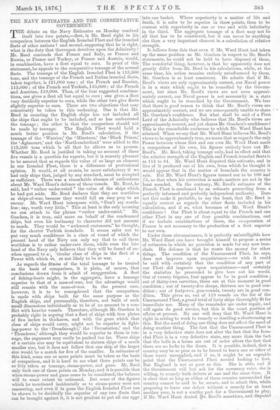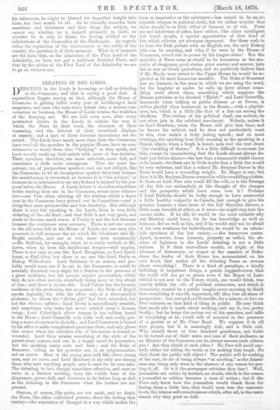THE NAVY ESTIMATES AND THE CONSERVATIVE GOVERNMENT.
TEETdebate on the Navy Estimates on Monday resolved .tself into two points,—first, is Mr. Reed right in his comparison between the English Ironclad Fleet and the ironclad fleets of other nations and second, supposing that he is right, what is the duty that thereupon devolves upon the Admiralty? Mr. Reed contends that France and Italy, or France and Russia, or France and Turkey, or France and Austria would, in combination, have a fleet equal to ours. In proof of this statement, he appeals to the comparative tonnage of the several fleets. The tonnage of the English Ironclad Fleet is 113,500 tons, and the tonnage of the French and Italian ironclad fleets, taken together, is 121,000 tons' of the French and Russian, 113,000; of the French and Turkish, 143,000; of the French and Austrian, 119,000. Thus, of the four suggested combina- tions, one gives a fleet all but equal to ours ; one gives a fleet very decidedly superior to ours, while the other two give fleets slightly superior to ours. There are two objections that may conceivably be taken to this reckoning. One is that Mr. Reed in counting the English ships has not included all the ships that ought to be included, and so has understated the tonnage ; the other is that the comparison should not be made by tonnage. The English Fleet would hold a much better position in Mr. Reed's calculation, if the tonnage of the 'Warrior,' the 'Minotaur,' the 'Black Prince,' the 'Agincourt,' and the 'Northumberland' were added to the 113,500 tons which is all that he allows us to possess. Whether Mr. Reed is justified in taking no account of these five vessels is a question for experts, but it is scarcely pleasant to be assured that as regards the value of so large an element in our Ironclad Fleet, there is a difference of professional opinion. It would, at all events, be more satisfactory if we had only ships that, judged by any standard, must be accepted as sufficient. There was a remarkable absence of enthusiasm about Mr. Ward Hunt's defence of these vessels. Mr. Reed, he said, had "rather under-rated" the value of the ships which he had put aside. Mr. Reed declares that they are worthless as ships-of-war, because they would fall an easy prey to an enemy. Mr. Ward Hunt interposes with, "Don't say worth- less ; say, worth very little." This at least is the only meaning we can attach to the phrase "rather under-rated." Mr. Goschen, it is true, said more on behalf of the condemned ships, but even his testimony to character did not amount to much. They would be "awkward customers," he thought, for the shorter Turkish ironclads. It seems safer not to put very much confidence in a class of vessel of which the present head of the Navy can only say that to call them worthless is to rather under-rate them, while even the late head of the Navy only believes that they will be found of use when opposed to ak,, -ticular class of ships in the fleet of a Power with which vh, re not likely to be at war.
As regards the fitness of the total tonnage to be treated as the basis of comparison it is plain, of course,' that conclusions drawn from it admit of exaggeration. A fleet of fishing-boats might, in the aggregate, have a tonnage superior to that of a man-of-war, but the advantage would still remain with the man-of-war. In the present case, however, it is to be remesnbered that the comparison is made with ships built for the same purpose as the English ships, and presumably, therefore, not built of such small dimensions individually as to be of no account in a con- flict with heavier vessels. Therefore, although Mr. Goschen is probably right in arguing that a fleet of ships with iron plates of five inches in thickness, and with the guns which that class of ships would carry, might not be superior in fight- ing-power to the 'Dreadnought,' the Devastation,' and the Thunderer,' although they would be superior to them in ton- nage, the argument may easily be pushed too far. Three ships of a certain size may be equivalent to sixteen ships of a much smaller size, but it does not follow that one ship of the larger size would be a match for five of the smaller. In estimates of this kind, some one or more points must be taken as the basis of comparison, and it is hard to see what three points can-be so fitly taken as tonnage, steam-power, and guns. Mr. Reed only took one of these points on Monday, and it is possible that when steam-power and guns come to be considered, the balance will to some extent be redressed. But some of the figures which he mentioned incidentally as to steam-power were not reassuring, and even if in guns the English Ironclad Fleet can be shown to be decidedly the superior of any two fleets that can be brought against it, it is not prudent to put all our eggs into one basket. Where superiority is a matter of life and death, it is safer to be superior in three points, than to be content with superiority in one or two and with inferiority in the third. The aggregate tonnage of a fleet may not be all that has to be considered, but it can never be anything else than a very important element in a calculation of relative strength.
It follows from this that even if Mr. Ward Hunt had taken up the same position as Mr. Goschen in respect to Mr. Reed's statements, he could not be held to have disposed of them. The wonderful thing, however, is that he apparently does not greatly differ from Mr. Reed in his calculations, while, at the same time, his action remains entirely uninfluenced by them. Mr. Goschen is at least consistent. He admits that if Mr. Reed's views are only approximately correct, our Naval power is in a state which ought to be remedied by the Govern- ment, but since Mr. Reed's views are not even approxi- mately correct, our Naval power is not necessarily in a state which ought to be remedied by the Government. We fear that there is good reason to think that Mr. Reed's views are approximately correct, and we are consequently unable to share Mr. Goschen's confidence. But what shall be said of a First Lord of the Admiralty who believes that Mr. Reed's views are approximately correct, and yet shares Mr. Goschen's confidence? This is the remarkable eminence to which Mr. Ward Hunt has attained. When we say that Mr. Ward Hunt believes Mr. Reed's views to be approximately true, we mean that as regards the only Power between whose fleet and our own Mr. Ward Hunt made a comparison of his own, his figures entirely bore out Mr. Reed's. Mr. Reed, taking tonnage only, had in effect said that the relative strength of the English and French ironclad fleets is as 114 to 84. Mr. Ward Hunt disputed this estimate, and in lieu of it produced one of his own, from which he thought it would appear that in the matter of Ironclads the country is safe. But Mr. Ward Hunt's figures turned out to be 100 and 75, so that when his correction is made, matters are not in the least mended. On the contrary, Mr. Reed's estimate of the French Fleet is confirmed by an estimate proceeding from a perfectly informed and perfectly independent authority. Does not this make it probable, to say the least, that Mr. Reed is equally correct as regards the other fleets included in his calculation, and if so, what becomes of Mr. Ward Hunt's confidence? Our Fleet is about equal to the French and one other Fleet in any one of four possible combinations, and if we include combinations of three, the co-operation of France is not necessary to the production of a fleet superior to our own.
Under these circumstances, it is perfectly unintelligible how Mr. Ward Hunt can have brought himself to propose a series of estimates in which no provision is made for any new iron- dads. His defence is that he wants the money for other things. The condition of the Unarmoured Fleet, he says, does not improve upon acquaintance—we wish it could be said with certainty that the condition of any part of our Fleet, did improve upon acquaintance—and certainly the statistics he proceeded to give bore out his words. Out of twenty frigates, four appear to be in good condition ; .out of thirty-two corvettes, three are at this moment in good condition ; out of twenty-five sloops, thirteen are in good con- dition; out of forty4wo gun-vessels, twenty are in good con- dition. This gives us, out of 119 vessels on the list of the Unarmoured Fleet, a grand total of forty ships thoroughly fit for immediate use. Many of the remainder are under repair, and will again do good service, but this is the exact position of affairs at present. No one will deny that Mr. Ward Hunt is right in setting to work to remedy so startling a shortcoming as this. But the need of doing one thing does not affect the need of doing another thing. The fact that the Unarmoured Fleet is in a very defective state does not alter the fact that the Iron- clad Fleet is in a very defective state, any more than the fact that the bells in a house are out of order alters the fact that there are no locks to the doors. It is possible, indeed, that a country may be so poor as to be forced to leave one or other of these wants unsupplied, and if so, it might be an arguable point that the Unarmoured Fleet needed looking to first. But England is not so poor as this. She is able, and if the Government will but ask for the necessary votes, she is willing, to remedy both defects at one and the same time. It is clear that so long as either of them remains unremedied the country cannot be said to be secure, and to admit this, while proposing to leave one defect without a remedy for at least another year, is not a worthy part for a Government to play. If Mr. Ward Hunt denied lIr. Reed's assertions, and disputed
his inferences, he might be blamed for imperfect insight into facts, but that would be all. As he virtually concedes both assertions and inferences and then drops the subject, we cannot say whether he is himself primarily in fault, or whether he is only to blame for having yielded to the solicitations of the Chancellor of the Exchequer. As regards either the reputation of the Government or the safety of the country the question is of little moment. What is of moment are the facts that, on the admission of the First Lord of the Admiralty, we have not got a sufficient Ironclad Fleet, and that by the choice of the First Lord of the Admiralty we are to go on without one.



































 Previous page
Previous page